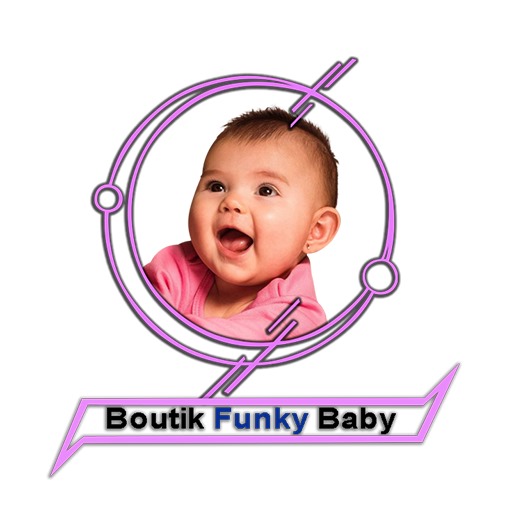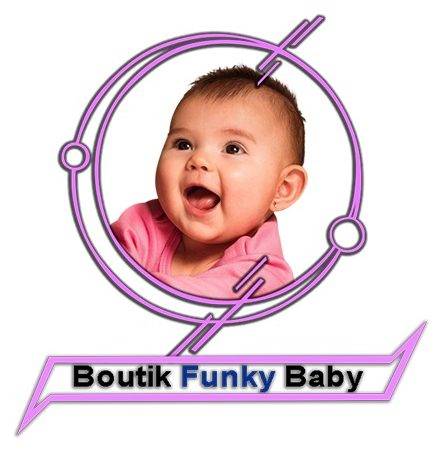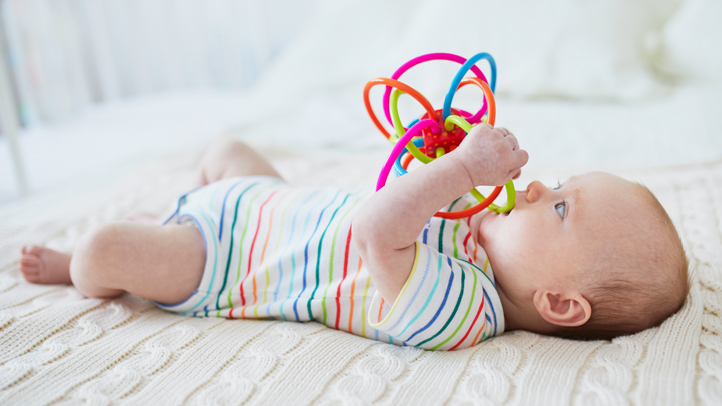Babies playing with toys develop essential cognitive and motor skills. Toys stimulate their imagination and promote sensory exploration.
Toys play a vital role in a baby’s development. They engage the baby’s senses and encourage exploration. Bright colors, different textures, and various sounds help stimulate cognitive growth. Simple toys like rattles, soft blocks, and teething rings can enhance hand-eye coordination.
As babies grow, interactive toys such as stacking rings or shape sorters can challenge their problem-solving abilities. Parents should choose age-appropriate toys to ensure safety and foster developmental milestones. By playing with toys, babies also learn about cause and effect, which is crucial for their understanding of the world around them. Engaging with toys can be both fun and educational.
Importance Of Play
Play is vital for a baby’s development. It helps them learn about the world. Through play, babies explore new concepts and strengthen their abilities. Toys play a crucial role in this process, offering stimuli for growth.
Cognitive Growth
Toys help babies understand shapes, colors, and textures. These experiences boost their cognitive development.
Playing with building blocks can improve problem-solving skills. Simple puzzles enhance a baby’s ability to think logically.
Interactive toys like musical instruments can stimulate brain development. They encourage sensory exploration and hand-eye coordination.
Emotional Well-being
Playtime can significantly impact a baby’s emotional health. It helps them express and manage their emotions.
Soft toys can offer comfort and build a sense of security. Role-playing toys, like dolls, allow babies to understand and express feelings.
Group play fosters social skills and empathy. Babies learn to share, take turns, and interact positively with others.
| Activity | Benefit |
|---|---|
| Building Blocks | Problem-solving and logical thinking |
| Soft Toys | Emotional security and comfort |
| Musical Instruments | Sensory exploration and brain development |
- Toys provide essential learning experiences.
- Interactive play promotes cognitive and emotional growth.
- Group activities enhance social skills.
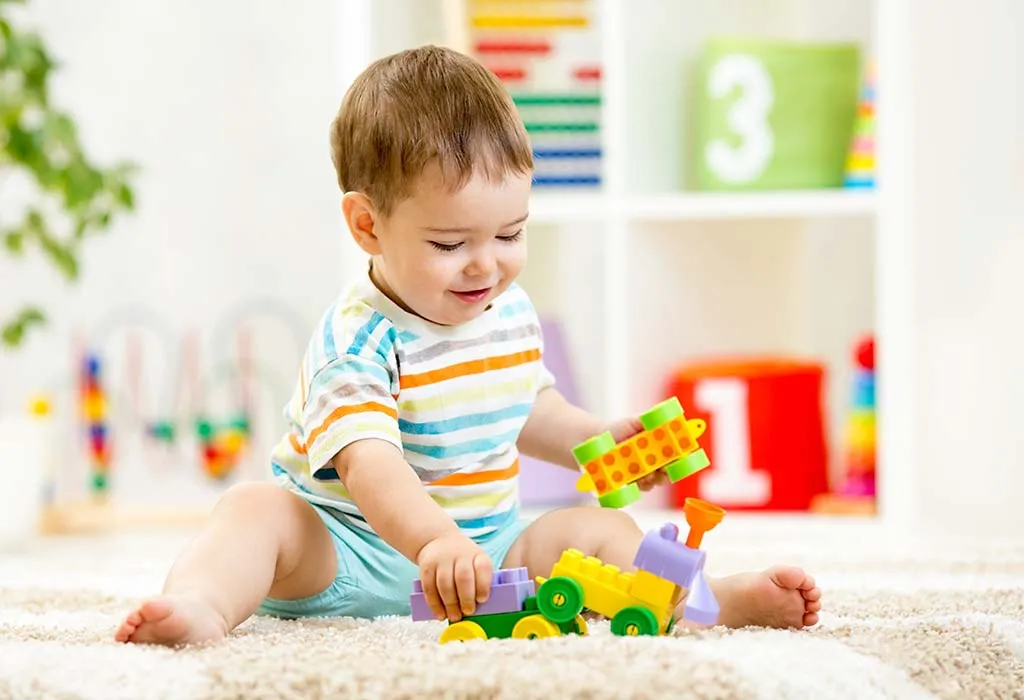
Credit: parenting.firstcry.com
Choosing The Right Toys
Choosing the right toys for your baby is important. Toys help babies learn and grow. They offer fun and educational experiences. The right toy can make a big difference in your baby’s development. Let’s look at some key factors.
Age Appropriateness
Each toy should match your baby’s age. This ensures the toy is safe and beneficial. Here’s a guide:
| Age Group | Recommended Toys |
|---|---|
| 0-6 months | Soft rattles, teething rings, plush toys |
| 6-12 months | Building blocks, stacking toys, activity centers |
| 12-18 months | Push toys, shape sorters, musical toys |
Safety Considerations
Safety is a top priority for baby toys. Keep these tips in mind:
- No small parts: Avoid toys with small pieces. These can be choking hazards.
- Non-toxic materials: Ensure toys are made from non-toxic materials. Babies often put toys in their mouths.
- Sturdy construction: Choose well-made toys. They should not break easily.
- Easy to clean: Select toys that are easy to clean. Babies can be messy.
Types Of Developmental Toys
Babies playing with toys is not just fun. It is crucial for their growth. Developmental toys help babies learn new skills. These toys support sensory, motor, and cognitive development. Let’s explore different types of developmental toys.
Sensory Toys
Sensory toys stimulate a baby’s senses. They are designed to engage sight, sound, touch, taste, and smell. These toys are essential for sensory development.
- Textured Toys: Toys with different textures help babies explore touch.
- Musical Toys: Toys that produce sounds introduce babies to new auditory experiences.
- Colorful Toys: Brightly colored toys attract a baby’s visual attention.
| Type | Benefit |
|---|---|
| Textured Toys | Enhances touch and feel senses. |
| Musical Toys | Improves auditory skills. |
| Colorful Toys | Boosts visual perception. |
Motor Skills Toys
Motor skills toys help babies develop physical abilities. These toys encourage movement and coordination.
- Building Blocks: Help improve hand-eye coordination.
- Push and Pull Toys: Encourage walking and balance.
- Stacking Rings: Enhance fine motor skills.
| Type | Benefit |
|---|---|
| Building Blocks | Boosts hand-eye coordination. |
| Push and Pull Toys | Encourages walking and balance. |
| Stacking Rings | Improves fine motor skills. |
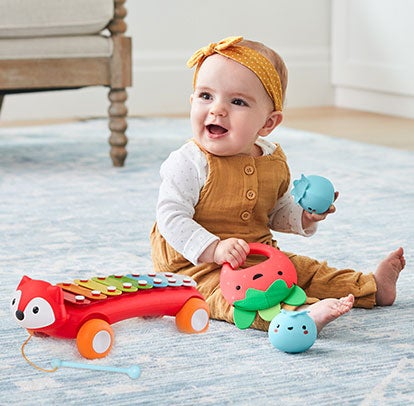
Credit: www.skiphop.com
Benefits Of Interactive Play
Interactive play with toys provides many benefits for babies. It helps them grow and learn new skills. Babies enjoy playing with others. This teaches them to communicate and interact.
Social Interaction
Playing with toys helps babies learn social skills. Babies learn to share and take turns. They also learn to understand others’ feelings. This builds empathy and cooperation.
Interactive play encourages babies to make friends. Babies who play together become better at socializing. They learn to express themselves and listen to others.
Language Skills
Interactive play boosts language development in babies. Babies learn new words while playing. They hear different sounds and try to repeat them. This improves their speaking skills.
Parents can join in the play. They can describe the toys and actions. This helps babies understand and use new words. Over time, babies build a strong vocabulary.
| Benefit | Description |
|---|---|
| Social Interaction | Teaches sharing, empathy, and cooperation |
| Language Skills | Enhances vocabulary and speaking abilities |
Interactive play is important for a baby’s growth. It helps them become confident and smart. So, encourage your baby to play and learn every day.
Diy Toys And Activities
Babies love playing with toys. DIY toys and activities bring joy and fun. Creating these toys at home can be easy and affordable. Let’s explore some fun ideas.
Household Items
You can use common household items to create engaging toys for babies. These items are safe and easily available. Here are some creative ways:
- Empty Boxes: Use them as tunnels or forts.
- Plastic Bottles: Fill them with rice to make shakers.
- Wooden Spoons: These can be used as drumsticks.
- Old Socks: Turn them into sock puppets.
| Item | Activity |
|---|---|
| Empty Boxes | Build forts or tunnels. |
| Plastic Bottles | Make shakers with rice. |
| Wooden Spoons | Use as drumsticks. |
| Old Socks | Create sock puppets. |
Simple Crafts
Simple crafts can be fun and educational. Use basic craft supplies to make toys. Babies will enjoy the colors and textures. Here are some easy craft ideas:
- Paper Plate Tambourine: Staple two plates together with beans inside.
- Felt Shapes: Cut out different shapes and colors for sensory play.
- Yarn Balls: Wrap yarn around a cardboard piece to make soft balls.
- Cardboard Roll Cars: Use toilet paper rolls and bottle caps to create cars.
These crafts are simple and require minimal supplies. They encourage creativity and learning. Babies will have endless fun with these DIY toys.
Role Of Parents In Playtime
Playtime is crucial for a baby’s growth. It helps in learning new skills. Parents play a vital role during this time. Their involvement enhances the experience. Let’s explore the different ways parents can participate.
Active Participation
Active participation means being involved in your baby’s playtime. Parents should engage with their babies. This builds strong emotional bonds. Playing together makes babies feel loved and secure.
Here are some ways to actively participate:
- Get on the floor with your baby.
- Make eye contact and smile.
- Use toys that promote interaction.
Setting Examples
Parents are a baby’s first teachers. Setting examples during playtime is important. Babies learn by watching their parents. Show them how to play with toys correctly.
Consider these tips for setting examples:
- Demonstrate how to stack blocks.
- Show how to push toy cars.
- Teach simple games like peek-a-boo.
| Activity | Parent’s Role |
|---|---|
| Reading a book | Point to pictures and read aloud. |
| Building with blocks | Show how to stack and balance. |
Balancing Screen Time And Physical Play
Finding the right balance between screen time and physical play for babies is crucial. Today’s digital age offers numerous gadgets and apps designed for infants. However, too much screen time can hinder a child’s development. This section explores the challenges and healthy habits for balancing screen time and physical play.
Digital Age Challenges
The digital world is everywhere. Babies see screens at home, in cars, and even in strollers. Parents use tablets to entertain or educate their little ones. But too much screen time can lead to developmental issues.
Excessive screen exposure may affect a baby’s attention span. It can also impact social skills and language development. Babies need to explore their surroundings physically. They learn best by touching, feeling, and moving around.
Parental control over screen time is essential. Setting limits helps babies engage in more physical activities. Create a balanced routine to ensure healthy growth.
Healthy Habits
Developing healthy habits early on is vital. Encourage babies to play with physical toys. These toys help in building their motor skills and creativity.
Consider the following tips to promote physical play:
- Allocate specific times for screen use.
- Ensure screen time doesn’t exceed 1 hour daily.
- Engage in activities like reading books and playing with blocks.
- Encourage outdoor play whenever possible.
Creating a mix of activities helps in overall development. Babies need variety to grow healthy and strong. Physical play with toys offers many benefits:
| Physical Benefits | Mental Benefits |
|---|---|
| Improves motor skills | Enhances problem-solving |
| Boosts physical strength | Stimulates creativity |
| Encourages coordination | Improves focus |
By balancing screen time and physical play, parents ensure their babies develop well-rounded skills. This balance fosters a healthy, happy, and active lifestyle.
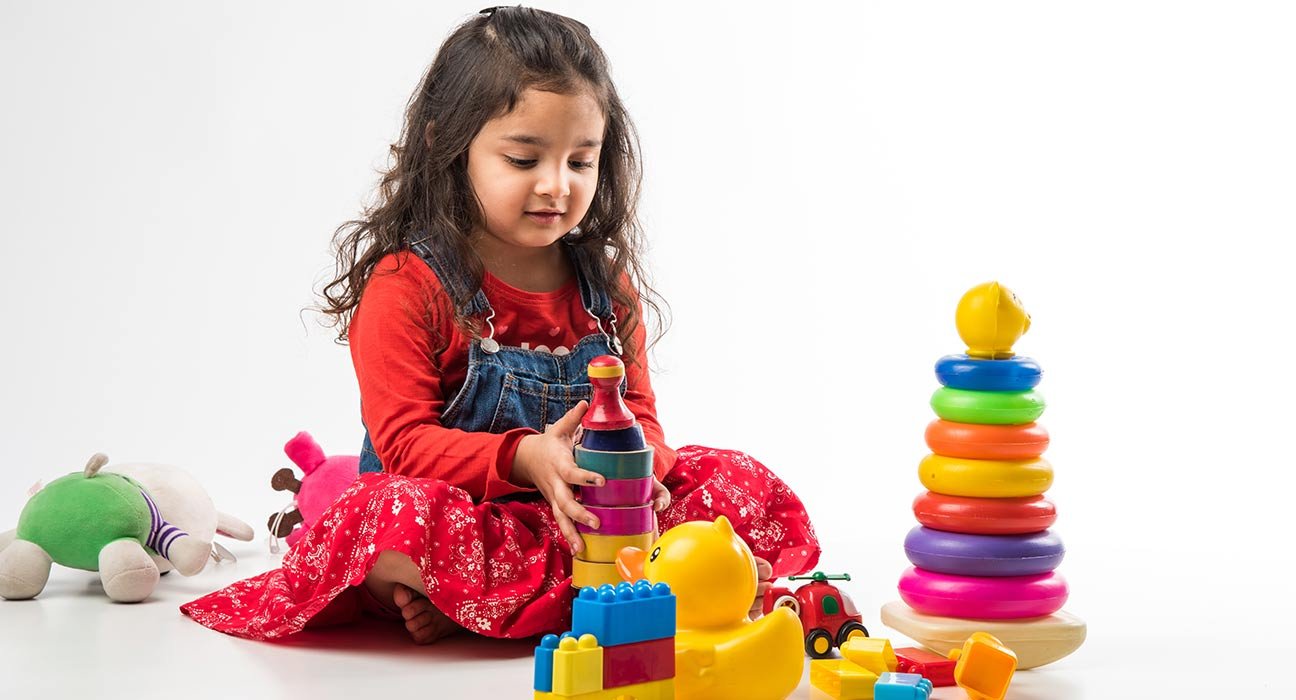
Credit: www.psychologs.com
Playtime Routine Tips
Creating a consistent playtime routine for your baby is crucial. It helps them understand what to expect and when. This routine can include various activities involving toys. Follow these playtime routine tips to make playtime enjoyable and beneficial for your baby.
Consistency
Establish a daily playtime schedule. This helps babies feel secure. Consistent playtimes make it easier for babies to transition between activities.
Consider setting specific times for different types of play:
- Morning play with educational toys.
- Afternoon play with physical toys.
- Evening play with calming toys.
Consistency helps babies develop a sense of routine. It also aids in their overall development.
Flexibility
While consistency is key, flexibility is equally important. Babies can be unpredictable. Sometimes they may not feel like playing at the scheduled time.
Allow some flexibility in your playtime routine:
- Have backup activities ready.
- Pay attention to your baby’s mood.
- Adjust playtime based on your baby’s needs.
Flexibility ensures that playtime remains fun and stress-free. It helps accommodate your baby’s changing preferences and moods.
Frequently Asked Questions
What Age Do Babies Play With Toys Properly?
Babies typically start playing with toys properly around 6 to 12 months old. This is when they develop better motor skills.
How Do Autistic Babies Play With Toys?
Autistic babies often engage in repetitive play with toys. They may focus on specific parts or arrange them methodically. Their play can be solitary, showing less interest in social interaction.
Is Playing With Toys Good For Babies?
Yes, playing with toys is beneficial for babies. It aids in cognitive development, motor skills, and social interaction. Toys stimulate creativity and problem-solving abilities. They also provide sensory experiences and emotional comfort. Engaging with toys helps babies explore their environment safely.
Is It Normal For Babies To Not Play With Toys?
Yes, it can be normal. Babies develop at different rates. Some may not show interest in toys immediately.
Conclusion
Toys play a vital role in a baby’s development. They stimulate learning and foster creativity. Choosing the right toys ensures your baby’s growth and happiness. Always prioritize safety and age-appropriate options. Encourage playtime to strengthen bonds and enhance developmental milestones.
Happy playing!
